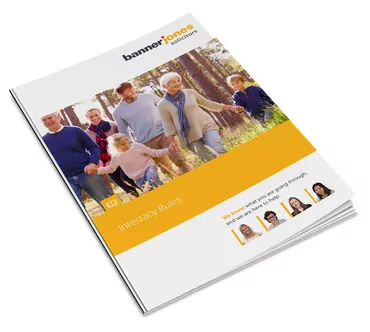The Intestacy Rules
- The whole estate must be realised – namely turned into cash.
- If there are beneficiaries who are under the age of 18 years, then their share is held on statutory trusts dependent upon the child attaining 18 years.
- The rules set out the person/persons entitled to apply for the grant of Letters of Administration and be appointed the Legal Personal Representatives for the deceased.
- Co-habitees and partners have no entitlement under these rules but registered Civil Partners have the same entitlement as spouses.
- The estate is shared between members of the family in accordance with the table below.
- If there are no relatives within the list the estate goes to the Crown.
If you do not want the Intestacy Rules to apply in your case, you must WRITE A WILL. The only way to truly guarantee that your estate is given to whom you wish, is to write a Will. Our specialist team at Banner Jones can guide you through the different types of Wills so that we prepare the right one to suit your circumstances. Families can be complex and it’s important to have a Will written that reflects your wishes properly.
What the Deceased Leaves
(The rates shown are as of 6th February 2020)
Spouse and children
Spouse receives the first £270,000 (plus interest) personal chattels, and one half of the remainder of the estate. Children (or their issue) receive the remaining half of the estate provided they reach 18 years.
Spouse but no children
Spouse receives the whole estate.
No spouse but children
Children (or their issue) receive the whole estate provided they reach 18 years.
No spouse or children but surviving parents
Parents receive the whole estate equally.
No spouse or children or parents but brothers and sisters or their issue
Siblings of the whole blood (i.e. who have the same parents as the deceased) share the estate equally; their children taking the share of a deceased sibling. If there are no siblings of the whole blood then siblings of the half blood (i.e. who have only one parent the same as the deceased) take instead in same way as above.
No spouse, children, parents or siblings but grandparents or uncles and aunts or issue of uncles and aunts
The whole estate is shared equally between relatives in order of priority listed. If any have pre-deceased, their share would pass to their children.


